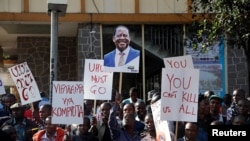Kenya's opposition coalition went to the Supreme Court late on Friday to challenge the results of a presidential election that it said was rigged
Election authorities have said President Uhuru Kenyatta won the August 8 election by 1.4 million votes, but opposition leader Raila Odinga said the results were false. He has not yet presented evidence of fraud.
Kenyans who remember the violence that followed the disputed 2007 election, when about 1,200 people were killed, were relieved when Odinga announced this week he would turn back to the courts, rather than the streets, to make his case.
Odinga also went to court to challenge the 2013 election result, and his decision to turn to the judiciary helped quell violence then.
Lawyers for Odinga's National Super Alliance did not speak to reporters as they entered the court just 90 minutes before it closed for the weekend and the deadline for delivering their petition would expire.
But a statement from Dennis Onyango, a spokesman for Odinga, gave details of the petition, saying votes for the opposition had been removed from the some of the totals. The statement also accused election officials of faking documentation.
"NASA [party] agents ... were removed from polling stations and replaced by impostors who were caused to sign fictitious names and sign blank result forms," the statement said.
"Data analysts have examined over 25,000 results forms for vote declarations and detected 14,000 of them that had errors ranging from statutory documents not signed by returning officers, others not authenticated by an official rubber stamp, and yet others that do not have agent names or signatures."
He did not give any specific examples.
The paper forms, which should have been signed by an agent for each part supervising the polling station, were designed to be an additional check against the possibility of rigging.
The electoral commission had been slow to publish scanned copies of papers detailing results from each of the country's 40,883 polling stations.
"The nature and extent of the flaws and irregularities so significantly affected the results that the [election commission] cannot accurately and verifiably determine the number of votes any of the candidates received," the petition concluded.
The Supreme Court has 14 days to review the petition, a constitutional requirement designed to minimize the period of uncertainty in case of an electoral dispute.
If the court upholds the election, Kenyatta will be sworn in. If Odinga can prove that rigging took place to an extent that would overturn the result, then Kenya must hold another presidential election in 60 days.
At least 28 people have been killed in election-related violence since polling day, many of them shot by police. But while there have been scattered protests in Odinga strongholds, the demonstrations were relatively muted.
International and domestic observers have said the election was largely free and fair.





